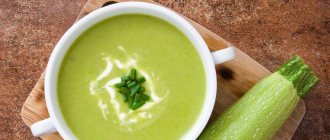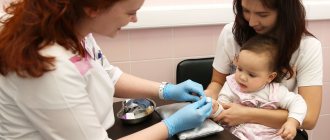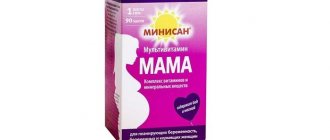Throughout your pregnancy, you've been learning the dos and don'ts of your situation. You learned a lot about anatomy, various diseases, medications, and traditional methods of treatment. You have most likely often restricted yourself from certain foods for various reasons while waiting for these restrictions to be lifted. And finally the baby was born.
Childbirth was by no means the end of the establishment of many taboos and the study of complex medical theory. This is just the beginning. After all, now you are a nursing mother, and the child is still very dependent on you. And even though he is already breathing on his own, feeding and caring for the baby rests entirely on the mother’s shoulders. Now you will study new sores - children's ones. But in order for such a need to arise as rarely as possible, the child should be given good health.
Of course, you laid the foundations at the planning stage, and later at the conception and carrying of the baby. But even now, after his birth, you are able to influence his health towards improvement or vice versa. And first of all – proper postpartum nutrition.
Why is it important?
Nutrition after childbirth is important in the sense that everything you eat will certainly reach the baby along with breast milk. Different products can have very different effects on the baby, often very undesirable and even extremely negative. Many of them will make the child swell; many cause allergies, pain, pain, discomfort and constipation in the baby. All without exception form the taste of milk, which may be very disliked by a small eater. Even the nervous system of a newborn is influenced by the food that comes with mother's milk. We should not forget that the first food will populate the intestinal microflora of the little person - and this is generally the basis for overall health throughout life.
In addition, during the birth you have done a lot of hard work, you are tired and exhausted. You haven't eaten for a long time, are weakened and, possibly, sewn from ruptures. Therefore, nutritional recommendations after childbirth are also important for your health.
Well, not the most important thing, but also important: in 9 months you most likely gained a couple of extra pounds. Several of them will go away on their own within the first 24 hours after birth. But you'll have to figure out the rest yourself. And nutrition has a direct bearing on this issue.
So, how should a woman eat after childbirth? What is possible and what is not? What is needed and why? How to get back into shape without sacrificing breastfeeding? And what to feed the baby so that he does not experience discomfort? First things first.
Proper postpartum nutrition
Immediately after the birth of a child, which in itself is a huge stress for the female body, a young mother, as a rule, loses from 5 to 6 kg. But still this is not enough to return to its former forms. After all, during the process of bearing a child, several more kilograms of excess fat accumulate, which provides energy to the body during childbirth, as well as during subsequent breastfeeding.
Therefore, nutrition after childbirth is a very important point for every new mother. In addition, it is also necessary to take into account the fact that one of the most important tasks of a woman after childbirth is establishing breastfeeding and ensuring the most proper nutrition for the baby. In the first days after childbirth, you should under no circumstances go on even a light weight loss diet or limit yourself in the amount of food you eat. Provided that the woman is breastfeeding, such restrictions are possible only two months after birth. However, they must be introduced gradually.
Nutrition in the first month after birth
If a woman is conscious about the process of breastfeeding her baby, then she understands perfectly well that the mother’s nutrition after childbirth should be especially thoughtful and correct. After all, all the food that a mother eats directly affects the quality of her milk, and, therefore, the nutrition of the baby.
The most responsible attitude towards nutrition should be in the first month after the birth of a newborn. A young mother's diet should not include various food allergens, such as baked goods, milk, chocolate, etc. Unprocessed fruits and vegetables should not be consumed on the most important days for the child. Being picky about what a mother eats will help establish proper nutrition for the baby after birth and ensure the smooth functioning of his gastrointestinal tract. In this case, the risk that the newborn will suffer from colic, gas accumulation and other gastrointestinal problems is significantly reduced.
There is a special mother’s nutrition plan after the birth of a child, proven by many years of practice, which provides an optimal diet for the production of high-quality human milk. So, in the first days after childbirth, you should drink sweetened tea, cranberry juice, as well as a decoction of some herbs (for these purposes you can use yarrow, nettle, dill, shepherd’s purse). Women who have had a difficult birth and rupture are advised to consume about one liter of natural chicken broth every day. Thanks to the gluten contained in this broth, wound healing occurs more actively.
Already on the fourth day after the birth of the newborn, the mother can eat various porridges cooked in water. It is advisable to eat oatmeal, wheat, buckwheat and millet porridge. You can also prepare vegetable soup, steam fresh vegetables, and bake apples. You should not eat cabbage and potatoes in the first days after childbirth, as cabbage causes bloating, and potatoes contain a lot of starch. During these days, active milk production occurs, so a woman should limit her fluid intake to 1 liter per day for a while.
Later, seven days after birth, the amount of fluid should be increased again, drinking about two liters of drinks every day. Gradually, the diet of the first month after childbirth becomes more varied. A woman can alternate between eating lean fish, beef, and eating cheese and nuts several times a week. In the last days of the baby’s first month, the mother can introduce eggs, chicken, fruits, and legumes into the diet. Further diet can be formed without any special restrictions.
Following a strict postpartum diet
All women follow a postpartum diet to one degree or another. However, a more strict approach to nutrition should be taken by those mothers whose babies experience certain unpleasant symptoms due to a reaction to mother’s milk. So, a child may have a swollen tummy, constipation, diathesis, and excitement of the nervous system. Also, some foods can adversely affect the taste of mother's milk, thereby reducing the baby's appetite.
Proper nutrition after childbirth involves, in some cases, the complete exclusion of foods that cause allergic reactions in a newborn baby. Such undesirable foods for a child are honey, fatty meat broths, coffee, chocolate, strawberries, citrus fruits, pickles, canned food, and smoked meats. The baby may have a negative perception of sausage and the mother’s consumption of eggs too often. If your baby has an allergic reaction, such a refusal of food is advisable for some time, but not less than six months.
You should try to eat cabbage dishes, liver, carbonated drinks, and legume dishes very carefully. It is best to avoid baked goods and white bread completely.
A strict diet after childbirth, which is recommended for mothers of children prone to allergic reactions, provides a fairly wide selection of different products. First of all, this is oatmeal, vegetable soups without cabbage, beets and other stewed and boiled vegetables, fish and meat of necessarily low-fat varieties. It is also allowed to use vegetable oil and seaweed. All these products will not cause a negative reaction in the child.
You should be very careful when introducing raw fruits and vegetables into your diet. It is advisable to start this process with onions and beets. It is only important to very carefully monitor the child’s reaction to the mother’s consumption of a certain product and take an individual approach to creating your own diet. In order not to provoke serious allergic reactions in the child, the mother should try not to introduce more than one product into her diet every day and do this slowly and gradually.
Nutrition in the first six months after childbirth
Proper nutrition after childbirth involves providing a diet for a nursing mother in which her milk will be as nutritious and complete as possible.
A woman who has recently given birth to a child should not eat food rarely: the best option is to eat five times a day, and the portions should not be very large.
Every day, at a certain meal, you should introduce a number of foods that will provide the necessary variety in your diet. These are kefir or curdled milk, cottage cheese and curd products, vegetables, meat, eggs, fruits, vegetable oil, bread. Products must be combined wisely. According to the recommendations of experts, a woman’s diet after childbirth should contain approximately 100 grams of protein, 100 grams of fat, and about 500 grams of carbohydrates daily. It is important that food contains sufficient amounts of phosphorus, calcium, and vitamins.
A woman should eat beef, chicken or turkey every day, since it is meat that provides the body with iron and animal proteins. The meat should be boiled or stewed. When choosing fish, which is a source of not only protein, but also fatty acids important for a woman’s body, it is better to choose pike perch, cod, hake and other low-fat varieties. Fish can be boiled or baked in the oven. But with seafood, a young mother should be extremely careful, as they very often provoke an allergic reaction.
Among dairy products, it is optimal to prefer fermented baked milk, kefir, and yogurt. Unlike milk, such products are much better absorbed and at the same time they have a positive effect on the intestinal microflora. And to provide a woman’s body with the calcium she needs, it is best to eat cottage cheese: at least 100 g every day. However, it is advisable to avoid glazed sweet cheeses.
Eating vegetables has a positive effect on a woman’s intestinal functions, as they contain plant fibers and a wide variety of vitamins. You can eat vegetables both raw and boiled. For a young mother, beets, pumpkins, zucchini, and carrots are best. It is preferable to choose bananas, green apples, and pears from fruits. Dried fruits are very useful, they not only replace sweets, but also have a positive effect on the functions of the gastrointestinal tract. Of the flour products, rye bread and grain bread are most suitable for a nursing mother's menu.
In some cases, the doctor may advise the woman to take a multivitamin. To avoid constipation, it is important to adhere to the correct drinking regime: drinking at least two liters of fluid daily. Some time after giving birth, a young mother can gradually begin to drink milk. However, you should pay attention to the fact that too much milk consumed can provoke sensitization of the child’s body to cow’s milk protein.
In order for your baby to feed without disruption, it is equally important to adhere to the correct daily routine. You should try to ensure normal healthy sleep for a nursing mother: she should rest at least eight to nine hours a day. Without a doubt, both alcoholic beverages and smoking tobacco while feeding a baby are strictly contraindicated.
General recommendations for nutrition after childbirth
Experts are unanimous that a nursing mother should not feel hungry. Therefore, some doctors advise a woman to eat with her baby, who eats approximately once every 3-4 hours. While feeding your baby, you can snack on cheese, kefir, a piece of bread or boiled vegetables.
To avoid the lengthy process of cooking, a young mother can use frozen vegetables to prepare stews or soups. It is important that food is always at hand and that cooking takes little time, otherwise a woman risks missing meals due to being too busy.
Each woman must take into account her own reaction to certain products. If she has ever had an allergy to a certain dish or product, then it should definitely be excluded from the postpartum diet.
How to eat to lose weight after childbirth
During the period of bearing a child, the lion's share of women gain extra pounds. And returning to previous forms, as a rule, is not easy for a young mother. To ensure that the process of getting back into shape after childbirth is minimally difficult, you should take care of the future during pregnancy. The main thing is not to overeat while bearing a child, try to include only healthy foods in your diet and not indulge in sweets and fatty foods. Then, after the baby is born, several extra pounds will disappear within months of breastfeeding.
Due to very significant hormonal changes in the postpartum period, dieting is strictly prohibited for both nursing mothers and those women who, for some reason, do not breastfeed their babies. You can turn to restrictions no earlier than two to three months after giving birth.
In the meantime, postpartum nutrition in the first months should be organized so that the situation does not worsen further, and at the same time the baby receives adequate nutrition.
In the first weeks after giving birth, a new mother spends much more energy on daily activities and caring for her newborn. Therefore, about 500 additional calories are enough to cover these expenses. In order for a nursing woman to produce normal breast milk, an additional 800 kilocalories are needed every day. Approximately 300 calories are consumed for these purposes from fat that accumulated during pregnancy. Another 500 additional calories should be included in your daily diet. Thus, the daily calorie intake of food these days should be no more than 3000 calories. If the number of calories in the daily menu is much lower, then problems with lactation may occur. If the norm is exceeded, this is fraught with the appearance of excess weight.
However, it is important to take care of a balanced diet and exclude very high-calorie foods from the diet. These products include duck and goose meat, sour cream, mayonnaise, sugar, sweets, potatoes, and rice.
Despite the statement that a nursing mother should not be hungry, she should not constantly chew something either. It is better to eat at a strictly designated time, and while breastfeeding, you can have a light snack. Late in the evening, it is best to have a snack with fruit and a glass of milk or kefir.
There is an opinion that weight loss after childbirth will be facilitated by separate nutrition. This type of nutrition ensures that foods containing proteins and carbohydrates, proteins and fats, etc. are not combined in one meal. If you approach the diet wisely, then this method of nutrition will not harm the baby’s condition.
It is equally important to provide at least minimal physical activity, which should not be too tiring for a young mother. Over time, their intensity will increase.
When thinking about her diet, a woman who has recently given birth to a child should be aware that in this case there can be no talk of losing excess weight too quickly. Only a smooth and competent approach to the issue of postpartum nutrition will ensure stable results.
Doctors strongly recommend that a woman use strict diets to combat excess weight no earlier than her child is nine months old. However, in this case, a more effective method would be proper nutrition throughout life.
medside.ru
The first three days after birth
The most important rule now: a minimum of everything. It is ideal to eat as if you were coming out of a prolonged fast - extremely carefully and slowly.
Already from the first days of life, the intestines of a newborn baby begin to work. Start your diet with lighter foods so as not to burden your baby’s gastrointestinal tract.
Warm sweet tea, cranberry syrup, herbal infusions and decoctions (nettle, shepherd's purse, burnet) are suitable drinks. If you have received stitches, chicken broth is useful for faster healing. By the way, the absence of solid food will also help prevent the formation of stool, which is very important if you have been sewn.
By the end of the third day, gradually begin to introduce “more serious” food.
Peculiarities
It is important to choose products that contain a high content of vitamins and microelements. The composition should not contain allergens. The baby's body is still weak, the reaction to the mother's food can be unpredictable.
The mother's diet in the first days after childbirth consists of foods that are safe for the baby. To do this you need to follow simple rules:
- you cannot smoke or drink alcoholic beverages;
- It is recommended to sort fruits. At first, red and yellow ones are excluded, but green ones, on the contrary, are allowed;
- fish and meat products are boiled and steamed. It is better to choose low-fat varieties;
- Porridges are useful, as they promote lactation;
- To ensure an even supply of milk, you should eat every few hours.
Pay attention to the fact that the food is dietary.
The mother's diet in the first days after childbirth can be made more varied every week. New products are introduced gradually, and it is necessary to monitor how the baby’s body will react.
If the condition does not worsen within several days, then the product can be continued to be eaten. If, on the contrary, then next time they try the dish in a month.
Nutrition for a woman in labor is of great importance, so it needs to be varied and nutritious. The vitamins and microelements included in the composition affect the development of the baby. And mom will regain her strength much faster. The diet of the mother in labor is also important in the first days after childbirth, otherwise the child may have allergies or an upset stomach.
End of the first week after birth
Already on the fourth day you can start eating porridge. Oatmeal is best. You can have buckwheat, millet and wheat. But they must be cooked in water and without added sugar. You can use just a drop of salt or a little honey, but be very careful.
Also allow yourself two baked apples, but no more than twice a day. The same number of times you can eat vegetables stewed in vegetable oil: turnips, rutabaga, pumpkin, carrots, zucchini, eggplants. Beetroot is especially useful for a nursing woman.
You can also have vegetable or fruit soup - also twice a day. For now, we leave the drinking unchanged.
More on the topic
What can you eat after giving birth?
What to do if there is no milk after childbirth?
What soups can you eat after childbirth?
Nutrition after caesarean section
Diet after childbirth
Tasty and healthy
Apples support the body of a nursing mother well. Doctors recommend eating them both raw and baked. It is recommended to focus on juices. The following juices are especially useful during the postpartum period: plum, apple and quince. You should also consume dairy products every day. Milk is considered the most important product for a nursing mother. You need to drink about two glasses a day. It should be enough for both the needs of the mother’s body and the needs of the child’s body. Milk is very beneficial for both. It contains a very large amount of calcium, which is involved in the process of formation and strengthening of bones. In addition to milk, products such as kefir and low-fat cottage cheese will also be beneficial for you.
During the postpartum period, a woman's diet should include a lot of grain products. A variety of cereals with water or milk, brown rice, whole bread.
READ ALSO: Dietary features of a mother after childbirth
First month after birth
Starting from the second week, start drinking and eating more. Gradually increase the amount of liquid you drink daily to two liters, but still don’t drink too much. Introduce black bread crackers, low-fat sea fish and beef (preferably boiled) into your diet. Although it is preferable to make do with vegetables and cereals alone. You can also have nuts (except walnuts) and cheese. But be careful with dairy products. It is better to give up animal milk and all its derivatives: the calcium content in it exceeds the norm for a newborn by 6 times. In addition, animal milk contains hormones for building muscle mass and rapid growth of physically strong and large cubs. The purpose of mother's milk is completely different: to supply essential nutrients to the baby's brain. Therefore, milk should be consumed very carefully and infrequently for 8-9 months.
As for vegetables, fruits and berries. In addition to the fact that many of them are allergenic (be careful when choosing), it is strictly forbidden to consume them fresh. No foreign microorganisms are needed in children’s intestines now. Therefore, all products intended for mother’s nutrition must undergo heat treatment.
There is also a list of products that need to be excluded at first. And then introduce it very carefully and gradually. This, in addition to the mentioned milk and fresh vegetation, is baked goods; everything sweet, salty, pickled, sour, spicy, hot, and so on; eggs; canned food; any cabbage and legumes, regardless of the cooking method; carbonated drinks; strong tea; coffee; alcohol; chocolate and citrus.
Nutrition in the postpartum period
The nutrition of a nursing mother should be high in calories (3200 kcal), balanced, easily digestible
- The nutrition of a nursing mother should be high in calories (3200 kcal), balanced, and easily digestible.
- Spicy, fried, fatty smoked foods, canned food, alcohol, sausages (raw smoked, boiled-smoked, boiled), allergens for the child (chocolate, citrus fruits, coffee) should be excluded from the diet.
- A woman in labor should have 5-6 meals a day.
- Food should be consumed 20 - 30 minutes before breastfeeding.
- The volume of liquid per day is 2-2.5 liters. Herbal teas, drinking water, decoctions of dried fruits, and fermented milk products in a volume of 200-300 ml are recommended.
- To prevent anemia, it is recommended to prescribe up to 60 mg of iron per day, including in the diet of a nursing mother foods rich in this microelement (liver, legumes, hematogen, buckwheat, green salad, spinach, dill, parsley).
- Food should be consumed 20 - 30 minutes before breastfeeding.
- It is necessary that her diet include all major food groups: meat and fish, milk and dairy products; eggs; bread and bakery products, cereals, pasta; vegetable oils; butter; vegetables, fruits, berries, fruit and vegetable juices; sugar and confectionery.
- It is preferable to use different types of meat: lean pork, tongue, white poultry (preferably boiled or in the form of meatballs).
- Low-fat varieties of fish are recommended (pike perch, carp, cod, hake, etc.); It is also better to consume them boiled no more than 1-2 times a week.
- You can increase the amount of protein in your diet with cottage cheese and cottage cheese. Milk and dairy products should be consumed in heat-treated form: cheesecakes, cottage cheese casserole, condensed concentrated milk without sugar. It is advisable to partially replace whole cow's milk, an excess of which in the mother's diet can cause allergic reactions in infants, with various fermented milk products (kefir, yogurt, fermented baked milk, etc.).
- It is very important that the diet of a nursing mother contains enough dietary fiber to stimulate intestinal motility. To this end, the daily menu should include a significant amount (at least 400 g) of fresh or cooked vegetables (carrots, beets, zucchini, pumpkin, etc.), about 300 g of fruits and berries (for example, apples, pears, plums, currants , gooseberries, cherries), juices (200-300 ml), especially with pulp - both freshly prepared and canned (preferably intended for baby food). However, it is not recommended to eat tropical fruits (with the exception of bananas) and fruits colored orange and red. Millet, buckwheat and oatmeal cereals (it is better to alternate porridges), wholemeal bread and especially dried fruits (prunes, dried apricots) are also rich in dietary fiber.
- The daily diet of nursing women should contain 25 g of butter, 15 g of vegetable oils (sunflower, corn, soybean, olive).
- Sugar and confectionery products (preferably marshmallows, marshmallows, marmalade) should be eaten in limited quantities, as they have an allergenic effect and contribute to the deposition of fat in the body.
Email: This email address is being protected from spambots. You must have JavaScript enabled to view it.
Site Map
www.5gkb.by
Breastfeeding period
Gradually, you will introduce more and more new foods into your diet, very carefully monitoring your child’s reaction to them. First, allow yourself an egg (but not often), chicken once a week, fish. But it is better to get vegetable protein from legumes. Even after a month or more, you still cannot drink coffee and alcohol (and this applies to all types of it, including beer), eat chocolate, citrus fruits, and strawberries. It is advisable to exclude spicy, smoked, fried foods for the entire period of breastfeeding, at least for six months.
You can make bread and pasta from flour (without harmful sauces). Be sure to eat soups (only without cabbage), the above-mentioned unleavened porridges, baked and steamed vegetables. Gradually add cheese and sour cream. Be sure to use raw vegetable oil.
Start introducing fresh vegetables from onions and beets.
Of course, all of this is just indicative advice and recommendations. For complete peace of mind, consult your doctor and listen to your own mind and well-being.
Nutrition during the postpartum period
Nutrition during the postpartum period
The process of milk formation and its quality largely depend on a woman’s nutrition, so nutrition during breastfeeding must be taken seriously. After all, what you eat, your baby also gets. You shouldn't feel hungry for a long time, but you shouldn't overeat either. Excessive nutrition and forced drinking do not increase milk secretion, as some women mistakenly believe.
To avoid constipation, which some nursing women are prone to, it is recommended to include vegetable salads with sunflower oil in the diet, take soaked prunes and boiled beets on an empty stomach, and consume yogurt, kefir, and bifido products before bed. Laxatives, like any medications, should not be taken without a doctor's prescription. Occasionally you can resort to enemas.
It is necessary to limit the consumption of foods that include large amounts of easily digestible carbohydrates: sugar, jam, various sweets, sweets, sweet syrups, honey. We must remember that excess carbohydrates entering the body turn into fats, and this is one of the main factors leading to excess weight and obesity in the future.
If you gain weight, you should definitely consult a doctor.
Typically, such women have to slightly reduce the energy value of their diet by limiting white bread, cereals, potatoes, animal and, to a lesser extent, vegetable fats. In these cases, you should refrain from pies, confectionery, jam, honey, fatty meat and sausages. At the same time, you should not reduce your consumption of milk, meat, fish, other proteins, and especially fruits and berries.
During breastfeeding, it is not recommended (in the interests of the child) to consume canned food, smoked meats, strong tea, coffee, cocoa, chocolate, chocolate candies, citrus fruits (oranges, tangerines, grapefruits), spices, garlic, which sharply changes the taste and smell of breast milk . Under no circumstances should you drink alcoholic beverages of any kind.
A nursing mother needs to eat more often than usual - 5-6 times a day - and also at a certain time. Her diet includes the first breakfast - morning tea, second breakfast, lunch, afternoon snack, dinner. In addition, it is advisable that shortly before bedtime the woman drinks a little milk, kefir or yogurt, or eat a sandwich with cheese.
It is recommended to take food no later than half an hour before feeding the baby. The food ration must be distributed in such a way that the bulk of the total daily energy value comes from the first breakfast (about 25%) and especially from lunch (up to 40% or more). At the same time, for breakfast and lunch it is rational to mainly use foods rich in proteins - meat, fish, eggs. Second breakfast and dinner should mostly contain vegetable and cereal dishes.
In conclusion, we will say that you need to take care of the variety of food. A monotonous diet leads to a decrease in appetite, reduces the secretion of gastric juice, impairs the digestion and absorption of food, disrupts metabolism, which is always undesirable, and especially when breastfeeding a child.
Next chapter
med.wikireading.ru
Say stop to orange and chocolate
There are situations when a nursing mother eats a small piece of chocolate, and after feeding the child develops a rash on his cheeks. And when a mother allows herself to eat a cabbage salad, a sleepless night is guaranteed, as the child experiences bloating and colic.
Yes, there are children who react normally to any product eaten by their mother, but this is the exception rather than the rule. Therefore, a mother needs to carefully monitor her diet and plan it with the utmost care. Women during lactation should completely avoid: strawberries, red fish, peas, coffee, tea, nuts, chocolate, mayonnaise, canned food, alcohol, oranges.










